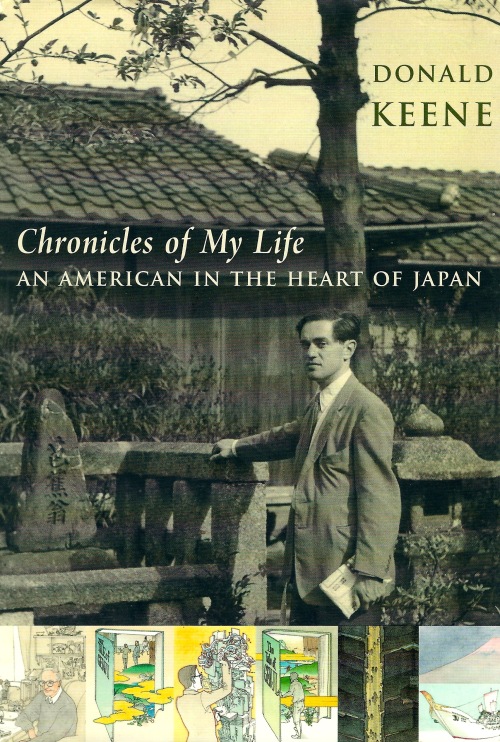Donald Keene, Chronicles of My Life: An American in the Heart of Japan
Columbia University Press, 2008
The first sentence of George Steiner’s first book (on Tolstoy and Dostoevsky) reads: “Literary criticism should arise out of a debt of love.” Donald Keene’s fascinating Chronicles of My Life tells the story of his love for Japanese literature over many decades. A few selections from the book point to his ardent commitment to reading, writing, and teaching.
____________________
When I think back on my life, it is clear that luck, rather than any decision made after long deliberation, has governed my life. The accident of sitting next to a Chinese in an undergraduate class awakened an interest in his country and later in all of East Asia, which has grown with the years until it is now the most important part of my life. The outbreak of the Pacific War, just at a time when I had begun to study Japanese, determined my whole life.
Japanese, which at first had no connection with my ancestors, my literary tastes, or my awareness of myself as a person, has become the central element of my life.
For me, the complicated way in which Japanese is written was one of its chief attractions. In fact, if Japanese were written in roman letters, I probably would not have felt the urge to conquer its difficulties. 27
Often I spent an hour or more trying to read just one sentence [of The Tale of Genji].
I felt that the most important thing I could do as a teacher was to pass on my enthusiasms, my love of Japanese literature, not to relay facts that could easily be found in books. A lecture, I decided, was not the best way to transmit information.
Apart from these gatherings, I almost never spoke English. I listened to Japanese radio, read Japanese newspapers, went to only Japanese films.
[Arthur]Waley was a genius. The word genius is sometimes used in Japan for any foreigner who can read Japanese, but Waley know not only Japanese and Chinese but also Sanskrit, Mongol, and the principal European languages. Moreover, he knew these languages not as a linguist interested mainly in words and grammar but as a man with an unbounded interest in the literature, history, and religion of every part of the world. He loved poetry written in the languages he knew, and if he did not know a language that was reputed to have good poetry, he did not begrudge the time needed to learn it. Late in life he learned Portuguese in order to read the portray of a young friend.
Without the example of Waley’s marvelous translations to inspire me, I doubt I would have devoted my life to transmitting to the world the beauty of Japanese literature.
The counterpart of my lifelong efforts to learn as much as possible about Japan and the Japanese has been my curiosity about how Japanese have regarded foreigners over the centuries.
I hope this chronicle, for all its deficiencies, has at least suggested how one human being spent an essentially happy life.
____________________
A young friend studying on the East Coast told me of his recent reading of Western literature, but he feels a need to go beyond the familiar. As one possibility, he, and others, could benefit from Donald Keene’s guidance, knowledge, and passion for the literature of Japan.
